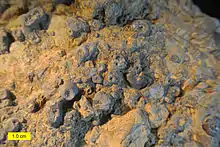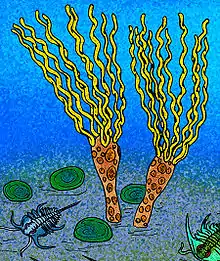Eocrinoidea
The Eocrinoidea are an extinct class of echinoderms that lived between the Early Cambrian and Late Silurian periods. They are the earliest known group of stalked, arm-bearing echinoderms, and were the most common echinoderms during the Cambrian.
| Eocrinoidea | |
|---|---|
 | |
| Eocrinoid holdfasts (Middle Ordovician, Utah) | |
 | |
| Colourful reconstruction of Gogia ojenai | |
| Scientific classification | |
| Kingdom: | Animalia |
| Phylum: | Echinodermata |
| Class: | †Eocrinoidea Jaekel, 1899 |
| Groups included | |
| |
| Cladistically included but traditionally excluded taxa | |
The eocrinoids were a paraphyletic group that may have been ancestral to six other classes: Rhombifera, Diploporita, Coronoidea, Blastoidea, Parablastoidea, and Paracrinoidea. The earliest genera had a short holdfast and irregularly structured plates. Later forms had a fully developed stalk with regular rows of plates. They were benthic suspension feeders, with five ambulacra on the upper surface, surrounding the mouth and extending into a number of narrow arms.[1][2] An unusual Ordovician form was the conical Bolboporites with its single brachiole.[3][4] See also List of echinodermata orders.
References
- Prothero, D.R.,2004, Bringing Fossils to Life; An Introduction to Paleobiology (2 ed.):New York, The McGraw-Hill companies, p. 324
- Barnes, Robert D. (1982). Invertebrate Zoology. Philadelphia, PA: Holt-Saunders International. pp. 1007–1008. ISBN 978-0-03-056747-6.
- Rozhnov, S.V. 2009. Eocrinoids and paracrinoids of the Baltic Ordovician basin: a biogeographical report. IGCP Meeting, Ordovician palaeogeography and palaeoclimate, Copenhagen, p. 16.
- Rozhnov, S.V. and Kushlina, V.B. 1994. Interpretation of new data on Bolboporites Pander, 1830 (Echinodermata; Ordovician), p. 179-180, in David, B., Guille, A., Féral, J.-P. & Roux, M. (eds.), Echinoderms through time (Balkema, Rotterdam).
External links
- Palaeos on Eocrinoids
- Evolutionary palaeoecology of early epifaunal echinoderms
- Cambrian explosion with Eocrinoid information